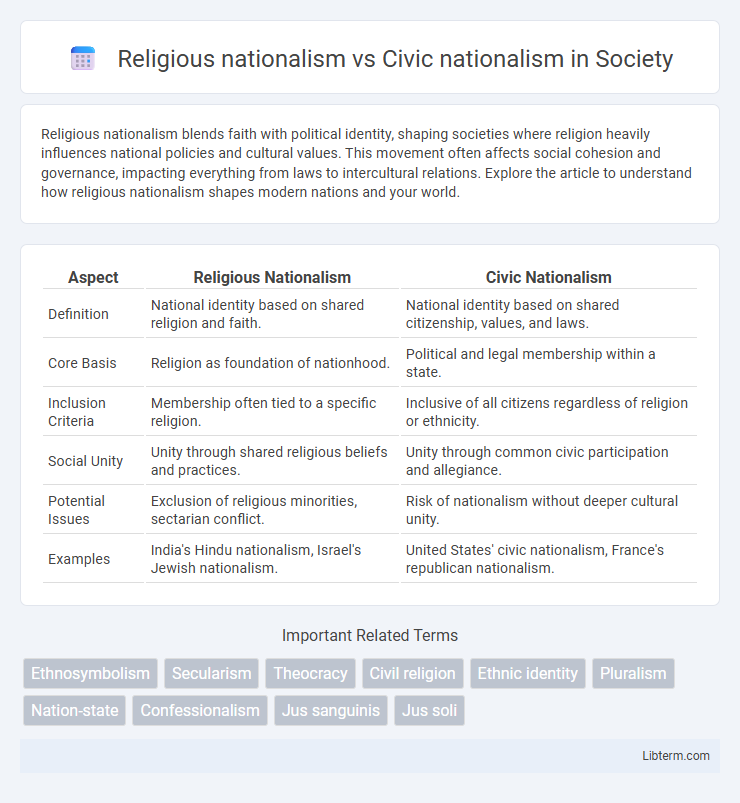Religious nationalism blends faith with political identity, shaping societies where religion heavily influences national policies and cultural values. This movement often affects social cohesion and governance, impacting everything from laws to intercultural relations. Explore the article to understand how religious nationalism shapes modern nations and your world.
Table of Comparison
| Aspect | Religious Nationalism | Civic Nationalism |
|---|---|---|
| Definition | National identity based on shared religion and faith. | National identity based on shared citizenship, values, and laws. |
| Core Basis | Religion as foundation of nationhood. | Political and legal membership within a state. |
| Inclusion Criteria | Membership often tied to a specific religion. | Inclusive of all citizens regardless of religion or ethnicity. |
| Social Unity | Unity through shared religious beliefs and practices. | Unity through common civic participation and allegiance. |
| Potential Issues | Exclusion of religious minorities, sectarian conflict. | Risk of nationalism without deeper cultural unity. |
| Examples | India's Hindu nationalism, Israel's Jewish nationalism. | United States' civic nationalism, France's republican nationalism. |
Defining Religious Nationalism and Civic Nationalism
Religious nationalism defines the nation primarily through shared religious beliefs and institutions, often intertwining faith with national identity and political sovereignty. Civic nationalism bases national identity on shared citizenship, political rights, and allegiance to secular laws rather than ethnic or religious backgrounds. This distinction influences policies, social cohesion, and the inclusivity of the nation-state in multicultural societies.
Historical Roots and Evolution
Religious nationalism traces its origins to historical periods where state identity was deeply intertwined with dominant religious traditions, exemplified by the Ottoman Empire's Islamic character or the role of Catholicism in medieval Europe. Civic nationalism evolved from Enlightenment ideals emphasizing shared citizenship, legal equality, and secular governance, with France's post-revolutionary republic as a key example. Over time, religious nationalism often reinforced communal identities through faith-based symbols, while civic nationalism promoted inclusive political membership regardless of religious affiliation.
Key Characteristics of Religious Nationalism
Religious nationalism is characterized by the fusion of national identity with a specific religious tradition, where the legitimacy of the state and its policies are closely tied to religious beliefs and practices. Key features include the promotion of a dominant religion as a core element of national unity, the use of religious symbols and narratives to mobilize support, and often, the exclusion or marginalization of minority religions or secular perspectives. This form of nationalism frequently influences laws, education, and public life, reinforcing the role of religion as a vital foundation for national identity and sovereignty.
Key Features of Civic Nationalism
Civic nationalism emphasizes inclusive citizenship based on shared values, political participation, and loyalty to state institutions rather than ethnic, religious, or cultural identity. It promotes equality, individual rights, and democratic principles, fostering unity through common legal frameworks and civic responsibilities. This form of nationalism supports a pluralistic society where diverse groups coexist while being united by allegiance to a constitutional order.
Major Global Examples: Case Studies
Religious nationalism is exemplified by India, where Hindu nationalism shapes political identity and policy, especially under the Bharatiya Janata Party (BJP), reinforcing religious symbols in governance. Civic nationalism is prominently seen in France, emphasizing secularism (laicite) and inclusive citizenship irrespective of religion, as reflected in its republican values and immigration policies. The United States demonstrates a hybrid model, with civic nationalism grounded in constitutional ideals while periodically experiencing religious nationalist influences in political discourse.
Political Implications of Both Forms
Religious nationalism often intertwines state power with a dominant religious identity, influencing laws and policies that can marginalize minority groups and restrict secular governance. Civic nationalism centers on shared citizenship and political values, promoting inclusive policies that emphasize equality and individual rights regardless of religious affiliation. These differing frameworks impact political stability, minority rights, and the role of religion in public life, shaping democratic institutions and national unity.
Impact on Social Cohesion and Minority Rights
Religious nationalism often challenges social cohesion by prioritizing a dominant faith, which can marginalize minority groups and undermine their rights, leading to increased social fragmentation. Civic nationalism promotes unity through shared political values and citizenship, fostering inclusive social cohesion and protecting minority rights within a pluralistic society. The divergent impact on minority rights and social integration shapes national identity and social stability significantly in each model.
Role in Modern Nation-Building
Religious nationalism emphasizes shared faith and sacred traditions as the core of national identity, often influencing legal systems and educational curricula to reflect religious values, which can both unify and polarize societies in modern nation-building. Civic nationalism prioritizes inclusive citizenship based on common political rights and democratic participation, fostering social cohesion through shared civic duties rather than ethnic or religious criteria. In contemporary nation-building, religious nationalism can strengthen cultural continuity but risks exclusion, while civic nationalism promotes pluralism and institutional stability essential for diverse, democratic states.
Challenges and Controversies
Religious nationalism often faces challenges related to exclusion and discrimination against minority groups, fueling social tensions and conflicts over national identity and state policies. Civic nationalism encounters controversies centered on defining citizenship and loyalty, particularly in multicultural societies where balancing universal rights with national unity proves complex. Both forms of nationalism can provoke debates about the role of religion, ethnicity, and political ideals in shaping inclusive governance and social cohesion.
Future Trends and Global Perspectives
Religious nationalism is projected to intensify in regions where faith-based identities align closely with political power, potentially reshaping global alliances based on doctrinal commonalities. Civic nationalism, emphasizing inclusive citizenship and secular governance, is expected to gain traction in multicultural societies aiming to balance diversity with national unity. Future trends indicate a dynamic interplay where countries navigate between these models, influencing international relations and domestic policies amid rising polarization and globalization.
Religious nationalism Infographic

 libterm.com
libterm.com